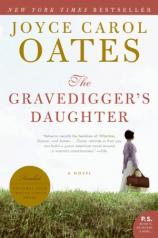The Gravedigger's Daughter
Review
The Gravedigger's Daughter
If
Joyce Carol Oates wrote a different kind of fiction, her legendary
prolificacy would hardly be worth remarking. If she wrote romances
or murder mysteries, for example, "churning out" a book a year
would be par for the course. Oates, however, continually impresses
readers, critics and other writers alike by consistently producing
compelling, challenging fiction with only rare missteps. With THE
GRAVEDIGGER'S DAUGHTER, Oates continues this strong tradition as
she tells the uniquely American story of one woman's self-discovery
against the background of post-World War II America.
The novel begins with a misunderstanding --- Rebecca Tignor, a
young wife and mother, has been mistaken by a stranger for Hazel
Jones, a person whom she doesn't know at all. Followed by the
intense, oddly compelling man, Rebecca hurries home from her
factory job. In her fear, Rebecca's mother's mistrust of strangers
comes back to haunt her now-grown daughter, and the narrative soon
shifts back to Rebecca's troubled childhood.
Rebecca is the youngest child and only daughter of Jacob and Anna
Schwart. Jacob, a former schoolteacher, has been hired as the local
gravedigger and cemetery caretaker for a small town in upstate New
York. The family, which has fled Nazi Germany, hopes that their
time in the rundown caretaker's cottage will be limited; but as
budgets, family stresses and crises mount up, they settle in for
good. Jacob Schwart, a taciturn, scheming man, despises townspeople
who mock the Schwarts as Jews and resents his daughter, the only
one of the family to be born in the United States. Anna Schwart,
who refuses to learn English and becomes an embarrassment to her
children, grows increasingly suspicious of her surroundings.
In the wake of the tragedy that follows the stressed family's
breaking point, Rebecca has her first chance to start her life
over, an opportunity that she seizes once more when her marriage
dissolves, again in a scene of horrific violence and terror. This
time, Rebecca seizes on the name of that mysterious "Hazel Jones,"
recreating herself into a new woman without a past to haunt or harm
her.
THE GRAVEDIGGER'S DAUGHTER is a sprawling, challenging portrait of
a life that seems entirely plausible, even in its violence and
sadness. Oates's Rebecca is coarse, crude and at times maddeningly
self-deluding, with a tendency to avoid self-reflection or
self-examination, especially when doing so might mean confronting
hard truths.
Some might grow frustrated by Oates's patent refusal to offer clear
answers about Rebecca's origins and characters. Instead, the novel
forces readers to reach their own conclusions about this woman whom
they will come, in so many ways, to know intimately, but who
remains fundamentally impossible to understand, even to herself.
The novel's abrupt, ambiguous ending offers the (unwritten)
possibility of reconciling the past and the future, but the story
that unfolds in the book eschews uplifting inspiration for a
grittier kind of redemption.
Reviewed by Norah Piehl on January 22, 2011
The Gravedigger's Daughter
- Publication Date: April 1, 2008
- Genres: Fiction
- Paperback: 624 pages
- Publisher: Harper Perennial
- ISBN-10: 0061236837
- ISBN-13: 9780061236839





